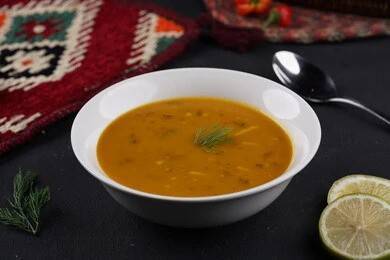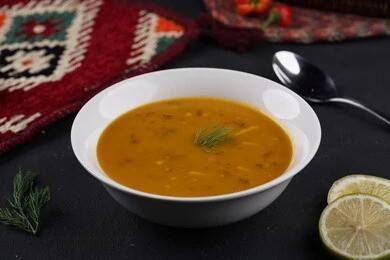No Ramadan table is complete without a bowl of hot soup, which fasting individuals prefer to start with when breaking their fast. It is the most important choice throughout the holy month. A warm bowl of soup can provide a sense of fullness and warmth, whether it’s a thick and creamy soup or one based on a light broth, due to its richness in essential nutrients.
According to the site "Eat This Not That," consuming hot soup has numerous benefits, but there are some considerations to keep in mind. Nutritionist Laura Burak explains that foods high in water content can provide a feeling of fullness more quickly, noting that "starting a meal with soup or salad, whether it is a large amount of water or low-calorie foods, will promote satiety and prevent overeating," meaning fewer calories can be consumed with a complete sense of satisfaction.
Burak advises that the soup should be rich in nutritious elements to avoid feelings of hunger and overeating, explaining that one should "opt for low-sodium soup that includes nutritious ingredients like vegetables, herbs, spices, fiber-rich grains, beans, peas, and lentils." More nutrients can be obtained for fewer calories, as studies have shown that soup can indeed be a contributing factor in weight loss and reducing the risk of obesity.
Dr. Burak states that broth-based soups represent a great nutritional deal, especially if they contain vegetables, beans, or lentils. Nutritionist Dr. Toby Amidor, author of the bestselling "Cookbook" according to the Wall Street Journal, believes that soup has the potential to be a fantastic source of nutrition, explaining that "if the soup is broth-based and contains a lot of vegetables and beans, it’s a great way to consume fiber and antioxidant vitamins A and C while obtaining potassium."
Experts warn against soups that contain cream, which are based on butter and other fat-rich ingredients instead of broth, as they tend to be packed with calories and saturated fats. Many nutritionists agree that when choosing soup, it is important to know that any soup containing cream will be high in fat.
Dr. Burak states that "soup made with heavy cream instead of broth can be calorie bombs and tends to contain high amounts of saturated fat (which is harmful to heart health)." Dr. Amidor agrees, adding that such types of soup can be unhealthy due to saturated fats that "have been shown to increase the risk of cardiovascular diseases, especially when consumed in large amounts."
In addition to being high in saturated fat, soup can also contain excess sodium. The American Heart Association recommends that an average person should not consume more than 2,300 milligrams of sodium daily, but a typical can of chicken soup can already contain 890 milligrams of sodium per serving.
Dr. Burak clarifies that "while soup can be a healthy option, it can also be high in sodium," especially when purchased ready-made rather than prepared at home. She recommends that to avoid consuming high levels of sodium, one should rely on homemade broth-based soups.
According to the report, nutritionists agree that making soup at home instead of ordering it from a restaurant or purchasing ready-to-eat packages is always the better health choice. Dr. Amidor adds that if there is an intention to have creamy soup, it’s better to rely on starchy vegetables when preparing it at home, "such as potatoes or pumpkin."




